Why Are Guns So Easy to Get Ahold of
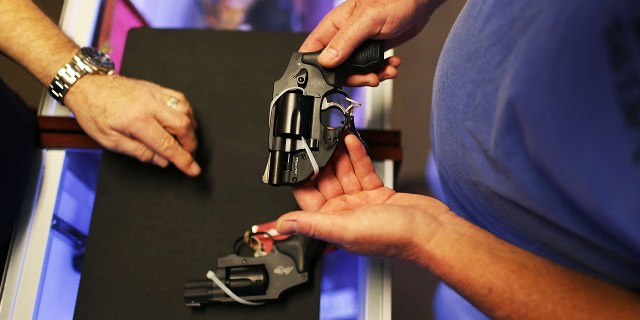
Guns are deeply ingrained in American society and the nation's political debates.
The Second Amendment to the U.S. Constitution gives Americans the right to bear arms, and about a third of U.S. adults say they personally own a gun. At the same time, President Joe Biden and other policymakers earlier this year proposed new restrictions on firearm access in an effort to address gun violence ranging from rising murder rates in some major cities to mass shootings.
Here are some key findings about Americans' attitudes about gun violence, gun policy and other subjects, drawn from recent surveys by Pew Research Center and Gallup.
In the aftermath of several recent mass shootings in the United States, Pew Research Center conducted this analysis to share key facts about Americans and guns. We used data from our own polling and from Gallup surveys to provide insights into Americans' views on gun policy and how those views have changed over time, as well as to examine the proportion of adults who own guns themselves and their reasons for doing so. Data about the number of monthly gun background checks comes from the FBI's National Instant Criminal Background Check System.
Methodology for each Pew Research Center poll can be found at the links in the post. Everyone who took part in the surveys is a member of the Center's American Trends Panel (ATP), an online survey panel that is recruited through national, random sampling of residential addresses. This way nearly all U.S. adults have a chance of selection. The survey is weighted to be representative of the U.S. adult population by gender, race, ethnicity, partisan affiliation, education and other categories. Read more about the ATP's methodology.
Four-in-ten U.S. adults say they live in a household with a gun, including 30% who say they personally own one, according to a Pew Research Center survey conducted in June 2021.
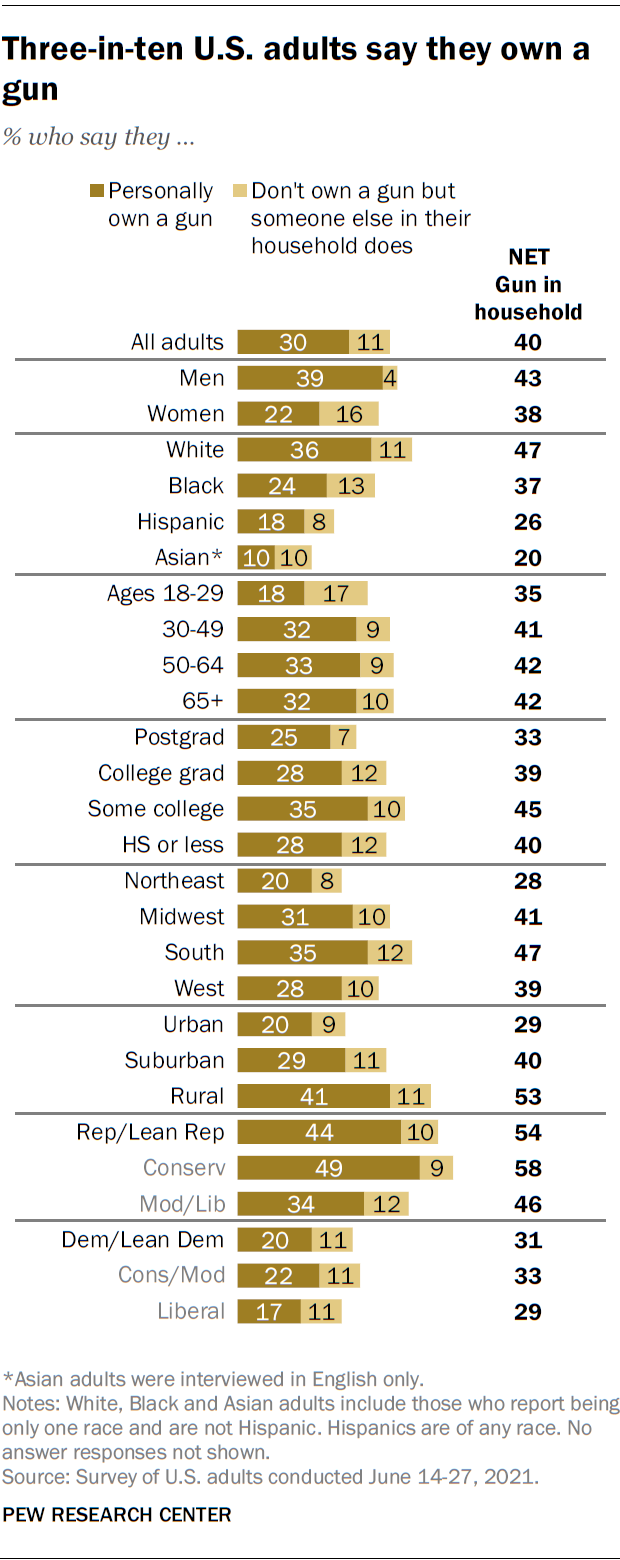
There are differences in gun ownership rates by political party affiliation, gender, geography and other factors. For instance, 44% of Republicans and Republican-leaning independents say they personally own a gun, compared with 20% of Democrats and Democratic leaners.
Men are more likely than women to say they own a gun (39% vs. 22%). And 41% of adults living in rural areas report owning a firearm, compared with about 29% of those living in the suburbs and two-in-ten living in cities.
Federal data suggests that gun sales have risen in recent years, particularly during the coronavirus pandemic. In 2020, the number of monthly federal background checks for gun purchases was consistently at least 20% higher than in the same month in 2019, according to the FBI's National Instant Criminal Background Check System. The largest comparative percentage point difference occurred in July 2020 – when about 3.6 million background checks were completed, 44% more than were conducted in July 2019.
Personal protection tops the list of reasons why gun owners say they own a firearm. In a Gallup survey conducted in August 2019, gun owners were most likely to cite personal safety or protection as the reason they own a firearm. Roughly six-in-ten (63%) said this in an open-ended question. Considerably smaller shares gave other reasons, including hunting (40%), nonspecific recreation or sport (11%), that their gun was an antique or a family heirloom (6%) or that the gun was related to their line of work (5%).
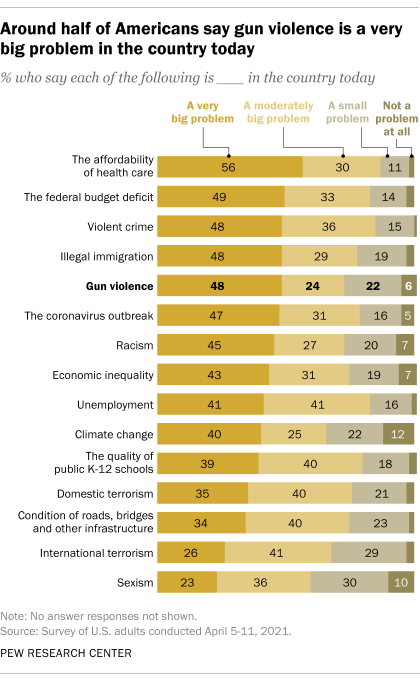
A Pew Research Center survey conducted in 2017 found similar patterns in firearm owners' stated reasons for owning a gun.
Around half of Americans (48%) see gun violence as a very big problem in the country today, according to a Pew Research Center survey conducted in April 2021. That's comparable to the share who say the same about the federal budget deficit (49%), violent crime (48%), illegal immigration (48%) and the coronavirus outbreak (47%). Only one issue is viewed as a very big problem by a majority of Americans: the affordability of health care (56%).
Another 24% of adults say gun violence is a moderately big problem. About three-in-ten say it is either a small problem (22%) or not a problem at all (6%).
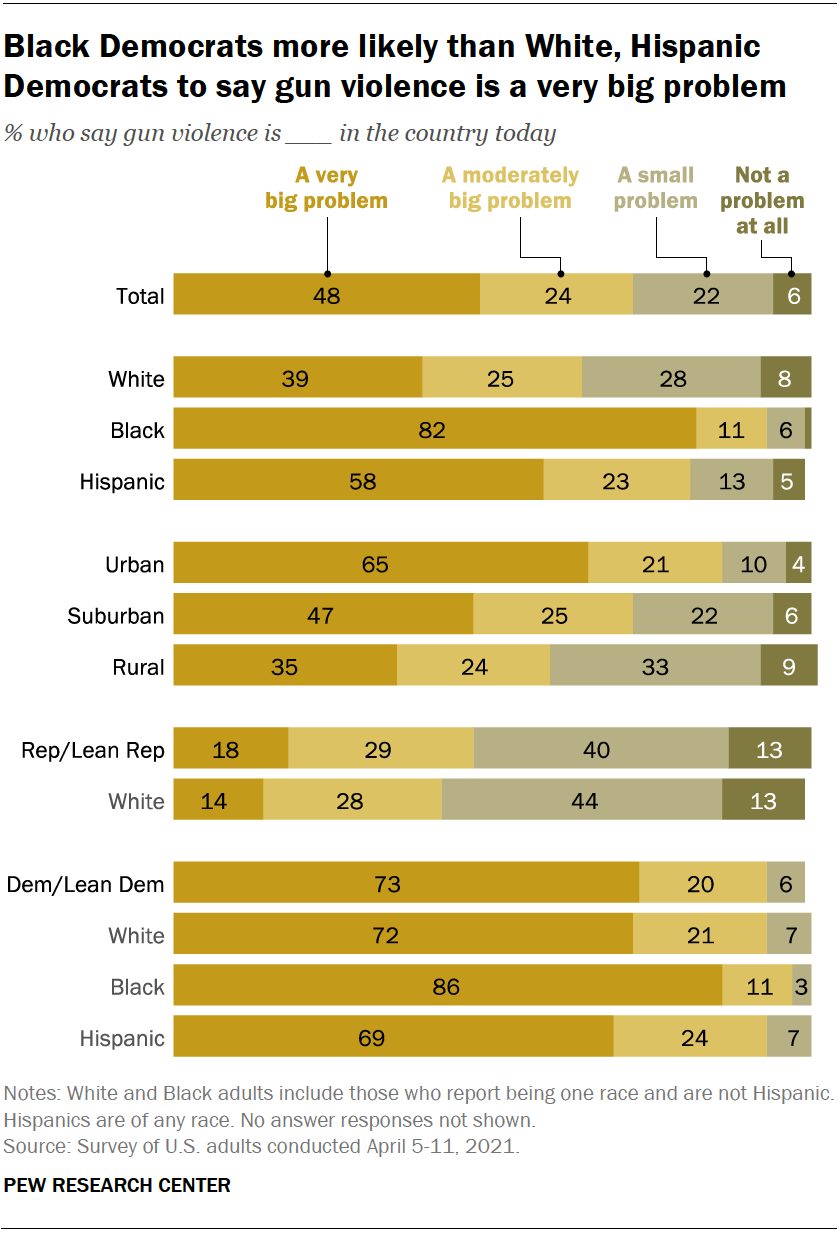
Attitudes about gun violence differ widely by race, ethnicity, party and community type. About eight-in-ten Black adults (82%) say gun violence is a very big problem – by far the largest share of any racial or ethnic group. By comparison, about six-in-ten Hispanic adults (58%) and 39% of White adults view gun violence this way. (Due to sample size limitations, data for Asian Americans is not available.)
Democrats and Democratic-leaning independents are far more likely than Republicans and GOP leaners to see gun violence as a major problem (73% vs. 18%). And nearly two-thirds of Americans who describe their community as urban (65%) say the same, compared with 47% of suburbanites and 35% of those who live in rural areas.
Roughly half of Americans (53%) favor stricter gun laws, a decline since 2019, according to the Center's April 2021 survey. Smaller shares say these laws are about right (32%) or should be less strict (14%). The share of Americans who say gun laws should be stricter has decreased from 60% in September 2019. Current opinions are in line with what they were in March 2017.
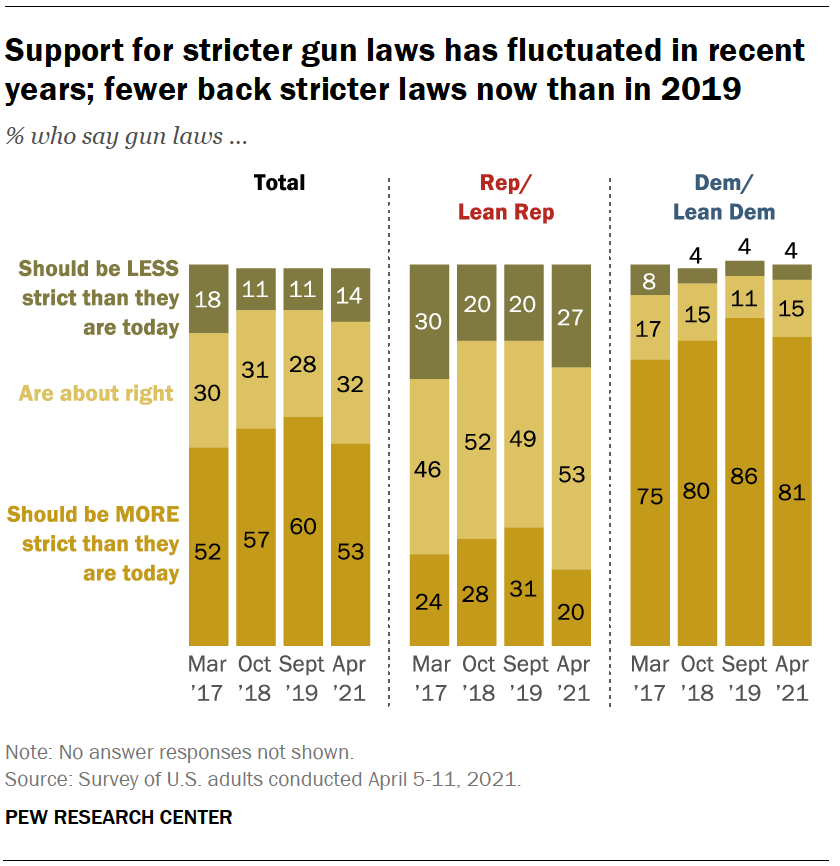
Among Republicans and Republican-leaning independents, views have shifted. Republicans are currently more likely to say gun laws should be less strict (27%) than stricter (20%). In 2019, by comparison, a larger share of Republicans favored stricter gun laws than less strict laws (31% vs. 20%). Both years, roughly half of Republicans said current gun laws were about right.
Today, a large majority of Democrats and Democratic leaners (81%) say gun laws should be stricter, though this share has declined slightly since 2019 (down from 86%).
Americans are divided over whether restricting legal gun ownership would lead to fewer mass shootings. Debates over the nation's gun laws have often followed recent mass shootings. But Americans are split over whether legal changes would lead to fewer mass shootings, according to the same spring 2021 poll. About half of adults (49%) say there would be fewer mass shootings if it was harder for people to obtain guns legally, while about as many either say this would make no difference (42%) or that there would be more mass shootings (9%).
The public is even more divided about the effects of gun ownership on crime overall. Around a third (34%) say that if more people owned guns, there would be more crime. The same percentage (34%) say there would be no difference in crime, while 31% say there would be less crime.
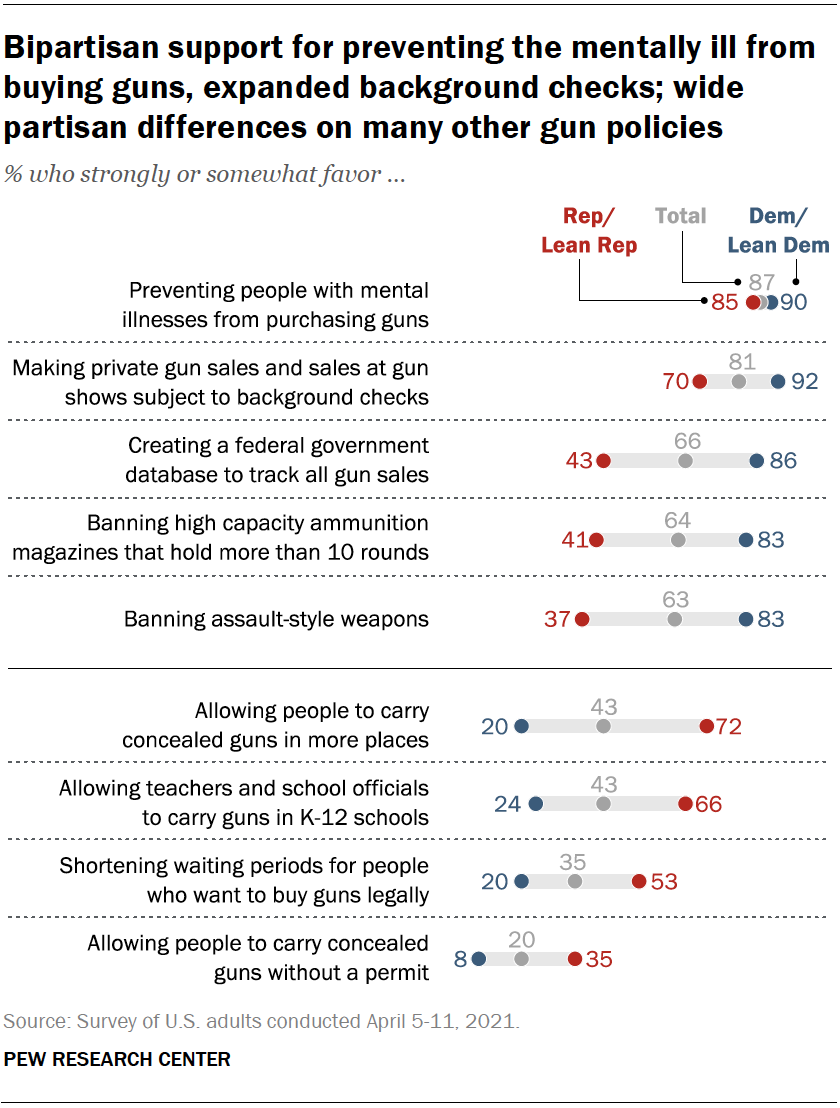
There is broad partisan agreement on some gun policy proposals, but most are politically divisive, the April 2021 survey found. Majorities in both partisan coalitions favor two policies that would restrict gun access: preventing those with mental illnesses from purchasing guns (85% of Republicans and 90% of Democrats support this) and subjecting private gun sales and gun show sales to background checks (70% of Republicans, 92% of Democrats). Majorities in both parties also oppose allowing people to carry concealed firearms without a permit.
Other proposals bring out stark partisan rifts. While 80% or more Democrats favor creating a federal database to track all gun sales and banning both assault-style weapons and high-capacity ammunition magazines that hold more than 10 rounds, majorities of Republicans oppose these proposals.
Most Republicans, on the other hand, support allowing people to carry concealed guns in more places (72%) and allowing teachers and school officials to carry guns in K-12 schools (66%). These proposals are supported by just 20% and 24% of Democrats, respectively.
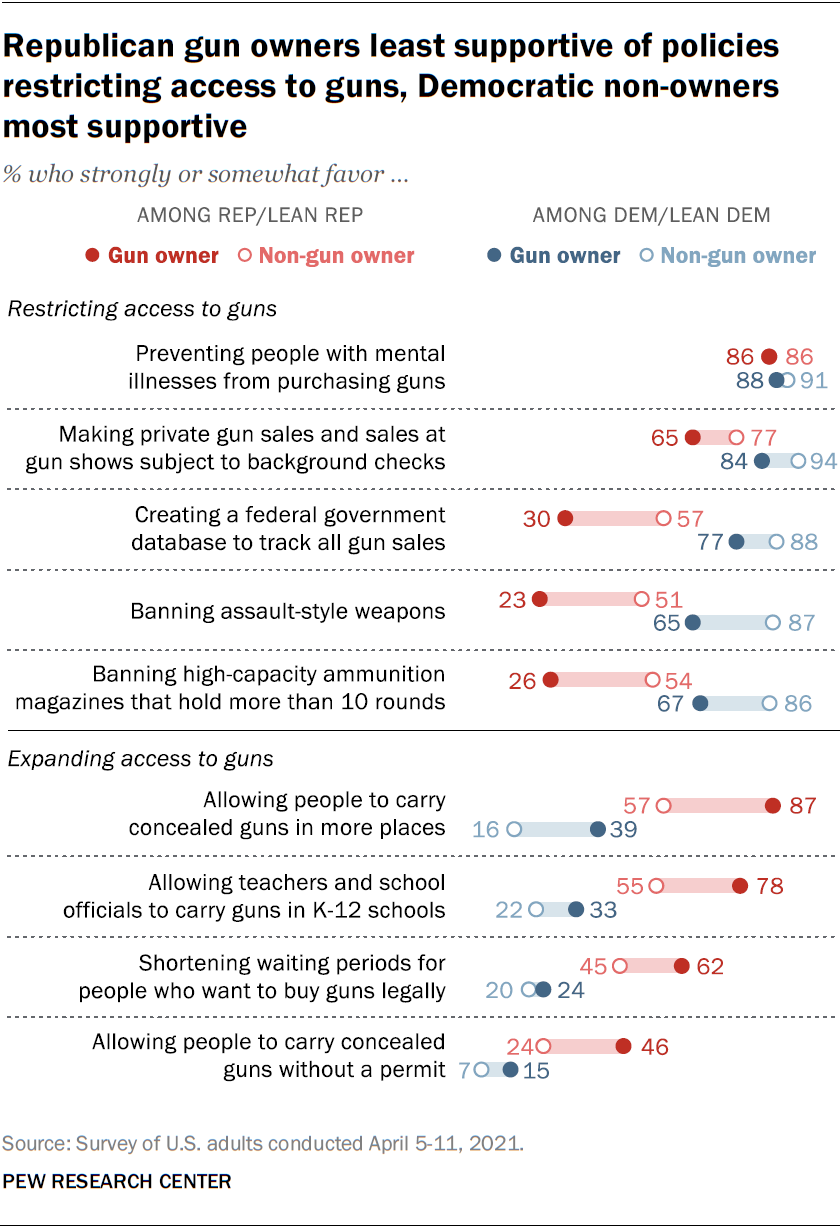
Gun ownership is closely linked with views on gun policies. This is true even among gun owners and non-owners within the same political party, according to the April 2021 Center survey.
Among Republicans, gun owners are generally less likely than non-owners to favor policies that restrict access to guns. Democratic non-gun owners are generally the most likely to favor restrictions.
For example, a majority of Republicans who don't own a gun (57%) say they favor creating a federal government database to track all gun sales, while 30% of Republican gun owners say the same. There are similar-sized gaps among Republicans who own guns and those who do not on banning assault-style weapons and high-capacity magazines.
Among Democrats, there are modest gaps on gun policies by gun ownership. For instance, while majorities of Democratic gun owners and non-owners both favor banning assault-style weapons and banning high-capacity magazines, Democratic gun owners are about 20 percentage points less likely to say this.
Americans in rural areas typically favor more expansive gun access, while Americans in urban places prefer more restrictive policies, according to the April 2021 survey. Even though rural areas tend to be more Republican and urban communities more Democratic, this pattern holds true even within each political party. For example, 71% of rural Republicans favor allowing teachers and other school officials to carry guns in K-12 schools, compared with 56% of Republicans living in urban places. Conversely, about half of Republicans who live in urban communities (51%) favor bans on assault-style weapons, compared with 31% of those living in rural areas.
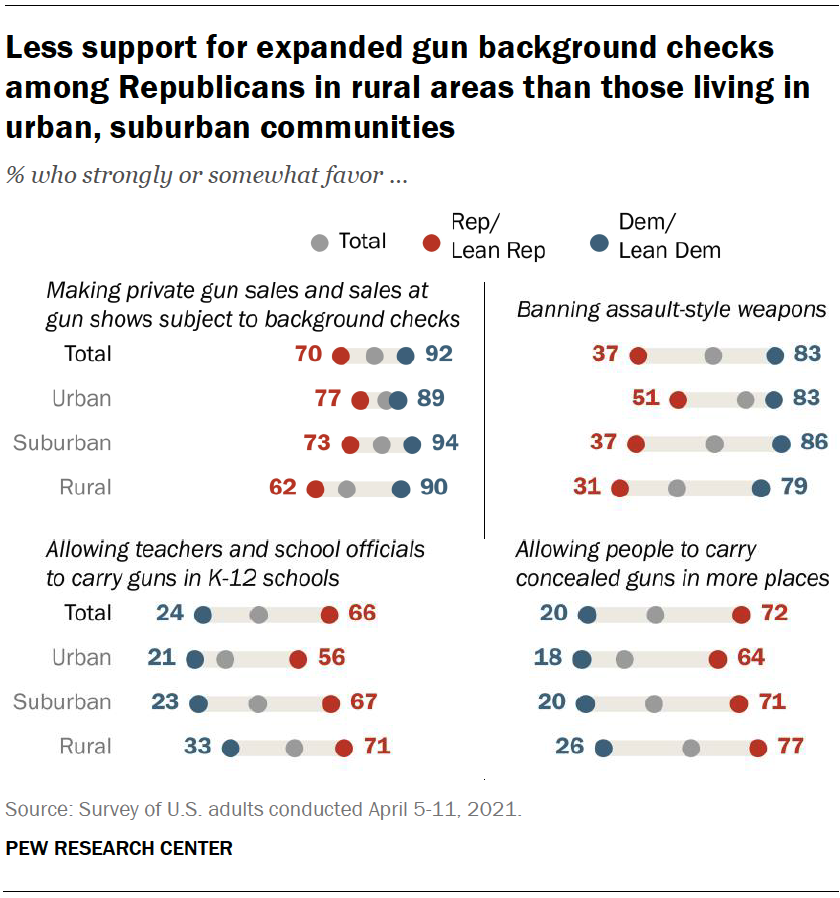
Democrats favor more gun restrictions regardless of where they live, but there are still some differences by community type. A third of rural Democrats (33%), for instance, support allowing teachers and other school officials to carry guns in K-12 schools, compared with 21% of those in urban areas.
Note: This is an update of a post originally published on Jan. 5, 2016.
bridgeforthupeor1956.blogspot.com
Source: https://www.pewresearch.org/fact-tank/2021/09/13/key-facts-about-americans-and-guns/
0 Response to "Why Are Guns So Easy to Get Ahold of"
Post a Comment